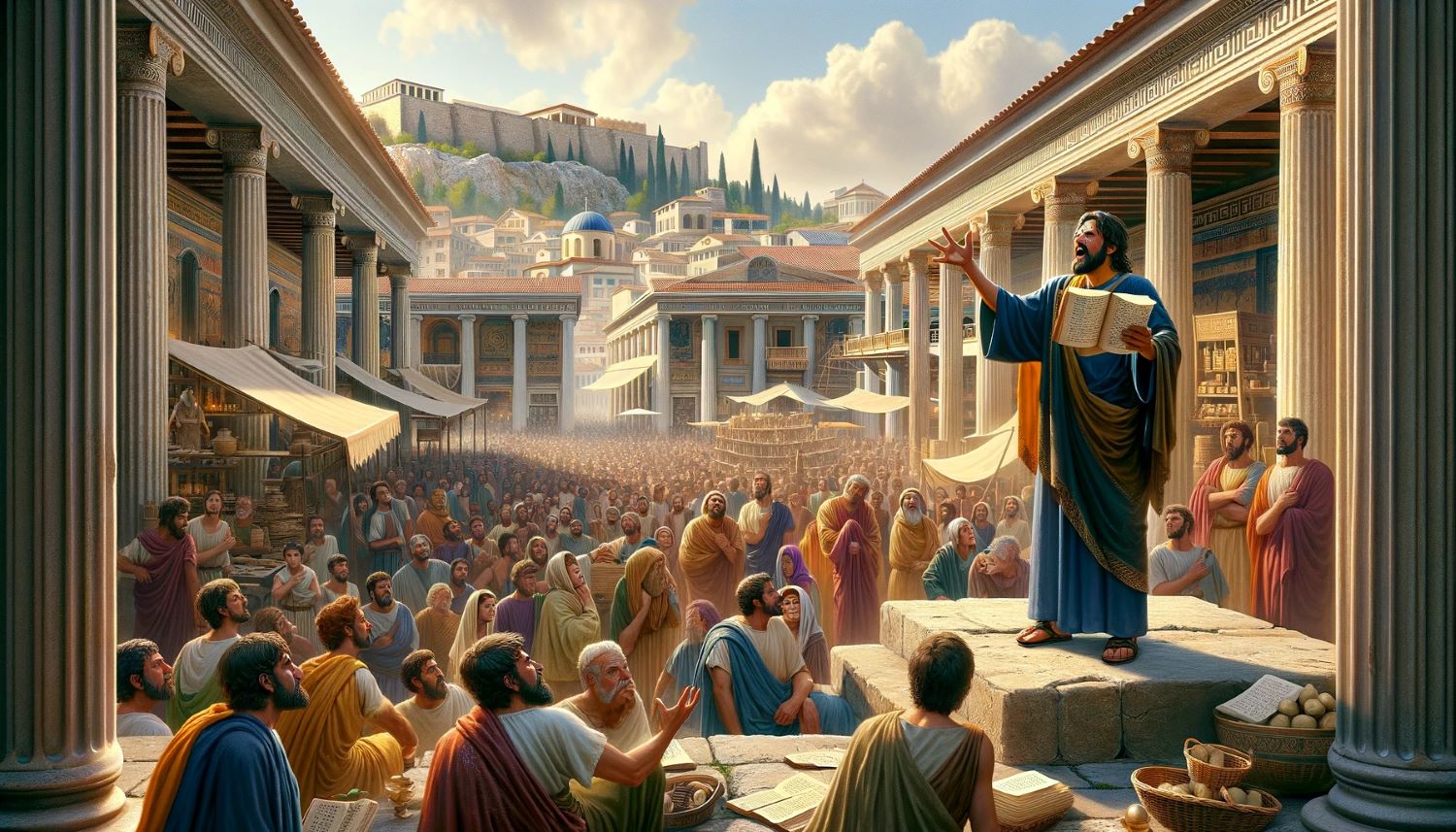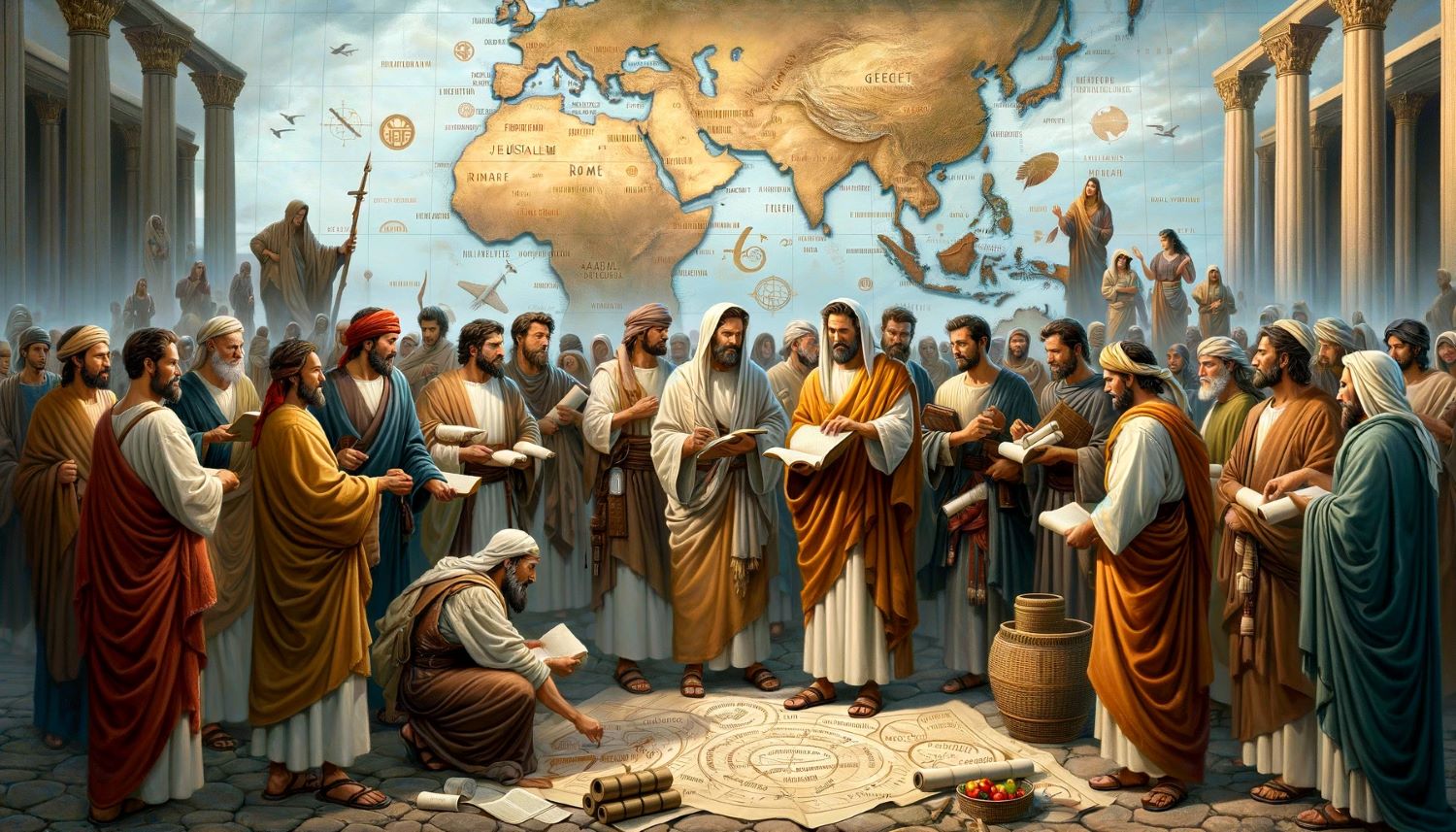Home>Bible Facts>Which Apostles Did Paul Meet


Bible Facts
Which Apostles Did Paul Meet
Published: February 22, 2024
Peter Smith, Editorial Director at Christian.net, combines deep insights into faith, politics, and culture to lead content creation that resonates widely. Awarded for his contributions to religious discourse, he previously headed a major organization for religious communicators, enhancing dialogue on faith's societal impacts.
Discover the fascinating encounters of the apostle Paul with various disciples in the Bible. Uncover intriguing Bible facts about Paul's interactions with different apostles.
(Many of the links in this article redirect to a specific reviewed product. Your purchase of these products through affiliate links helps to generate commission for Christian.net, at no extra cost. Learn more)
Table of Contents
Introduction
Paul, formerly known as Saul of Tarsus, is a prominent figure in the New Testament, renowned for his missionary journeys and prolific epistles. His encounter with Jesus on the road to Damascus transformed him from a zealous persecutor of Christians to one of the most influential apostles of early Christianity. While Paul's ministry and teachings are well-documented, his interactions with the other apostles, who had been disciples of Jesus during His earthly ministry, are equally intriguing.
In this article, we will delve into the fascinating accounts of Paul's meetings with some of the key apostles, shedding light on the dynamics of these encounters and their significance in the early Christian community. From his interactions with Peter, the foremost among the apostles, to his relationship with James, the brother of Jesus, and his encounter with John, the beloved disciple, Paul's engagements with these pillars of the faith offer profound insights into the unity and diversity within the early Christian movement.
As we explore these encounters, we will uncover the complexities of the relationships between Paul and the other apostles, examining the theological, cultural, and historical implications of their interactions. By delving into these narratives, we aim to gain a deeper understanding of the interconnectedness of the apostolic ministry and the diverse perspectives that contributed to the rich tapestry of early Christianity.
Join us on this enlightening journey as we unravel the accounts of Paul's meetings with the apostles, each encounter offering a glimpse into the vibrant mosaic of the early Christian community and the enduring impact of their collective mission.
Read more: Which Gospels Did Paul Write
Paul's Encounter with Peter
Paul's encounter with Peter, also known as Cephas, holds significant historical and theological implications within the early Christian narrative. The convergence of these two influential figures, each with distinct backgrounds and perspectives, underscores the diverse tapestry of the apostolic ministry.
The pivotal meeting between Paul and Peter took place in Jerusalem, where Paul sought to align his teachings with those of the established apostles. This encounter, as documented in the New Testament, highlights the delicate balance between preserving the essence of Jesus' teachings and embracing the cultural and theological nuances that permeated the early Christian communities.
The interaction between Paul and Peter is notably depicted in the account of the "Council of Jerusalem" in the book of Acts. This gathering, convened to address the inclusion of Gentile believers in the Christian community, brought Paul and Peter to the forefront of a crucial theological discourse. Their exchange not only reflected the complexities of navigating the intersection between Jewish tradition and the burgeoning Gentile converts but also underscored the unity amidst diversity within the early church.
Paul's deference to Peter's authority, coupled with his steadfast commitment to the gospel he preached, exemplifies the intricate dynamics at play during their encounter. While Peter, as a prominent leader among the apostles, carried the weight of tradition and the legacy of Jesus' earthly ministry, Paul brought a unique perspective shaped by his background as a Pharisee and his zealous dedication to spreading the message of Christ to the Gentiles.
The convergence of these distinct perspectives, marked by mutual respect and a shared commitment to the gospel, underscores the unity that transcended the diversity of backgrounds and experiences among the apostles. Paul's encounter with Peter serves as a testament to the collaborative spirit that characterized the early Christian movement, where differing viewpoints converged in a harmonious pursuit of proclaiming the transformative message of Jesus Christ.
In navigating the complexities of their encounter, Paul and Peter exemplified the essence of unity amidst diversity, laying a foundation for the inclusive nature of the Christian faith. Their meeting not only shaped the trajectory of the early church but also set a profound example of embracing diversity while upholding the unifying message of the gospel.
This pivotal encounter between Paul and Peter serves as a compelling testament to the interconnectedness of the apostolic ministry and the enduring impact of their collective mission in shaping the landscape of early Christianity.
Paul's Meeting with James, the Brother of Jesus
Paul's meeting with James, the brother of Jesus, holds profound significance in the annals of early Christianity. James, often referred to as "James the Just," played a pivotal role in the Jerusalem church and emerged as a prominent figure in the nascent Christian community. His familial relationship with Jesus imbued his leadership with a unique perspective, contributing to the rich tapestry of the apostolic ministry.
The encounter between Paul and James is a testament to the convergence of diverse backgrounds and perspectives within the early Christian movement. It is documented in the New Testament, particularly in the book of Galatians, where Paul recounts his visit to Jerusalem and his interaction with James, along with Peter and John, esteemed as "pillars" of the church.
James, steeped in the Jewish heritage and tradition, provided a bridge between the Jewish roots of Christianity and the burgeoning Gentile converts. His leadership in the Jerusalem church signified a nuanced approach to navigating the cultural and theological dynamics that permeated the early Christian communities. Paul's meeting with James exemplified the delicate balance between preserving the essence of Jesus' teachings and embracing the diverse cultural landscapes in which the gospel was proclaimed.
The dialogue between Paul and James underscored the unity amidst diversity within the early Christian movement. Their exchange, marked by mutual respect and a shared commitment to the gospel, exemplified the inclusive nature of the Christian faith. James' influence, rooted in his familial connection to Jesus and his leadership in the Jerusalem church, contributed to the multifaceted tapestry of early Christianity, enriching the collective mission of the apostles.
Paul's engagement with James, the brother of Jesus, serves as a poignant reminder of the interconnectedness of the apostolic ministry and the enduring impact of their collective mission. Their meeting not only shaped the trajectory of the early church but also exemplified the harmonious coalescence of diverse perspectives in the proclamation of the transformative message of Jesus Christ.
In navigating the complexities of their encounter, Paul and James exemplified the essence of unity amidst diversity, laying a foundation for the inclusive nature of the Christian faith. Their meeting stands as a compelling testament to the collaborative spirit that characterized the early Christian movement, where differing viewpoints converged in a harmonious pursuit of proclaiming the unifying message of the gospel.
This pivotal encounter between Paul and James serves as a profound testament to the interconnectedness of the apostolic ministry and the enduring impact of their collective mission in shaping the landscape of early Christianity.
Paul's Interaction with John, the Beloved Disciple
Paul's interaction with John, the Beloved Disciple, offers a captivating glimpse into the intricate tapestry of the early Christian community. John, revered as the beloved disciple and author of the Gospel of John, held a unique position among the apostles, characterized by his profound insights into the teachings of Jesus and his unwavering commitment to the message of love and redemption.
The convergence of Paul, renowned for his zealous missionary endeavors and profound theological acumen, with John, the beloved disciple, epitomizes the harmonious coalescence of diverse perspectives within the early Christian movement. While the New Testament does not explicitly detail a direct encounter between Paul and John, their respective contributions to the burgeoning Christian faith underscore the interconnectedness of their missions and the enduring impact of their collective ministry.
John's profound theological insights, particularly encapsulated in his Gospel and epistles, resonated with the universal message of love and redemption, complementing the expansive outreach of Paul's missionary journeys. The convergence of their distinct yet complementary contributions underscores the unity amidst diversity within the early Christian narrative, where varying perspectives converged in a harmonious pursuit of proclaiming the transformative message of Jesus Christ.
The enduring legacy of John, characterized by his emphasis on love, truth, and the eternal significance of Christ's redemptive work, resonated with the foundational principles that underpinned Paul's theological expositions. While their direct interaction may not be explicitly documented, the resonance of their teachings and the collective impact of their ministries underscore the interconnectedness of their endeavors in shaping the landscape of early Christianity.
In navigating the complexities of their respective ministries, Paul and John exemplified the essence of unity amidst diversity, laying a foundation for the inclusive nature of the Christian faith. Their collective influence, enriched by their distinct yet complementary contributions, serves as a poignant testament to the collaborative spirit that characterized the early Christian movement, where differing viewpoints converged in a harmonious pursuit of proclaiming the unifying message of the gospel.
The convergence of Paul's missionary zeal and theological depth with John's profound insights into the transformative message of Jesus Christ underscores the enduring impact of their collective mission in shaping the landscape of early Christianity.
Paul's Relationship with the Other Apostles
Paul's relationship with the other apostles, beyond his encounters with Peter, James, and John, offers a nuanced portrayal of the interconnectedness and diversity within the early Christian community. As a fervent proclaimer of the gospel to the Gentiles, Paul navigated a complex landscape of cultural, theological, and interpersonal dynamics in his interactions with the broader assembly of apostles.
The diversity of backgrounds and perspectives among the apostles, stemming from their varied experiences with Jesus during His earthly ministry, contributed to the rich tapestry of early Christianity. Paul's engagement with the other apostles exemplified the harmonious coalescence of these diverse viewpoints in the collective mission of proclaiming the transformative message of Jesus Christ.
Paul's relationship with the other apostles was characterized by mutual respect and a shared commitment to the gospel, despite the varying emphases in their ministries. While Paul's missionary endeavors extended to regions beyond the immediate purview of the other apostles, his theological acumen and unwavering dedication to spreading the message of Christ resonated with the foundational principles upheld by the broader assembly of apostles.
The apostolic ministry, marked by its inclusivity and collaborative spirit, transcended the diversity of backgrounds and experiences among the apostles. Paul's engagement with the broader assembly of apostles underscored the unity amidst diversity within the early Christian movement, where differing viewpoints converged in a harmonious pursuit of proclaiming the unifying message of the gospel.
The interconnectedness of Paul's ministry with the collective endeavors of the other apostles highlights the enduring impact of their collaborative mission in shaping the landscape of early Christianity. While their emphases and spheres of influence varied, the apostles collectively contributed to the vibrant mosaic of the early Christian community, enriching the tapestry of the faith with their diverse yet complementary perspectives.
In navigating the complexities of their relationships, Paul and the other apostles exemplified the essence of unity amidst diversity, laying a foundation for the inclusive nature of the Christian faith. Their collective influence, enriched by the convergence of diverse perspectives, serves as a poignant testament to the collaborative spirit that characterized the early Christian movement, where differing viewpoints converged in a harmonious pursuit of proclaiming the unifying message of the gospel.
The interconnectedness of Paul's ministry with the broader assembly of apostles underscores the enduring impact of their collective mission in shaping the landscape of early Christianity.
Conclusion
In conclusion, the accounts of Paul's meetings with the apostles offer profound insights into the interconnectedness and diversity within the early Christian community. From his pivotal encounter with Peter, the foremost among the apostles, to his meeting with James, the brother of Jesus, and his interaction with John, the beloved disciple, Paul's engagements with these pillars of the faith exemplify the harmonious coalescence of diverse perspectives in the collective mission of proclaiming the transformative message of Jesus Christ.
The convergence of these influential figures, each with distinct backgrounds and experiences, underscores the unity amidst diversity within the apostolic ministry. Paul's deference to the authority of the established apostles, coupled with his unwavering commitment to spreading the message of Christ to the Gentiles, exemplifies the collaborative spirit that characterized the early Christian movement. These encounters not only shaped the trajectory of the early church but also set a profound example of embracing diversity while upholding the unifying message of the gospel.
Furthermore, Paul's relationship with the broader assembly of apostles highlights the inclusivity and interconnectedness of their collective mission. Despite the varying emphases in their ministries, the apostles collectively contributed to the vibrant mosaic of the early Christian community, enriching the tapestry of the faith with their diverse yet complementary perspectives. The enduring impact of their collaborative mission resonates through the annals of early Christianity, underscoring the interconnectedness of their endeavors in shaping the landscape of the faith.
In navigating the complexities of their relationships, Paul and the other apostles exemplified the essence of unity amidst diversity, laying a foundation for the inclusive nature of the Christian faith. Their collective influence, enriched by the convergence of diverse perspectives, serves as a poignant testament to the collaborative spirit that characterized the early Christian movement, where differing viewpoints converged in a harmonious pursuit of proclaiming the unifying message of the gospel.
As we reflect on the narratives of Paul's meetings with the apostles, we gain a deeper understanding of the vibrant mosaic of the early Christian community and the enduring impact of their collective mission. These encounters not only exemplify the interconnectedness of the apostolic ministry but also offer timeless lessons on embracing diversity while upholding the unifying message of the gospel, resonating with the inclusive nature of the Christian faith.














